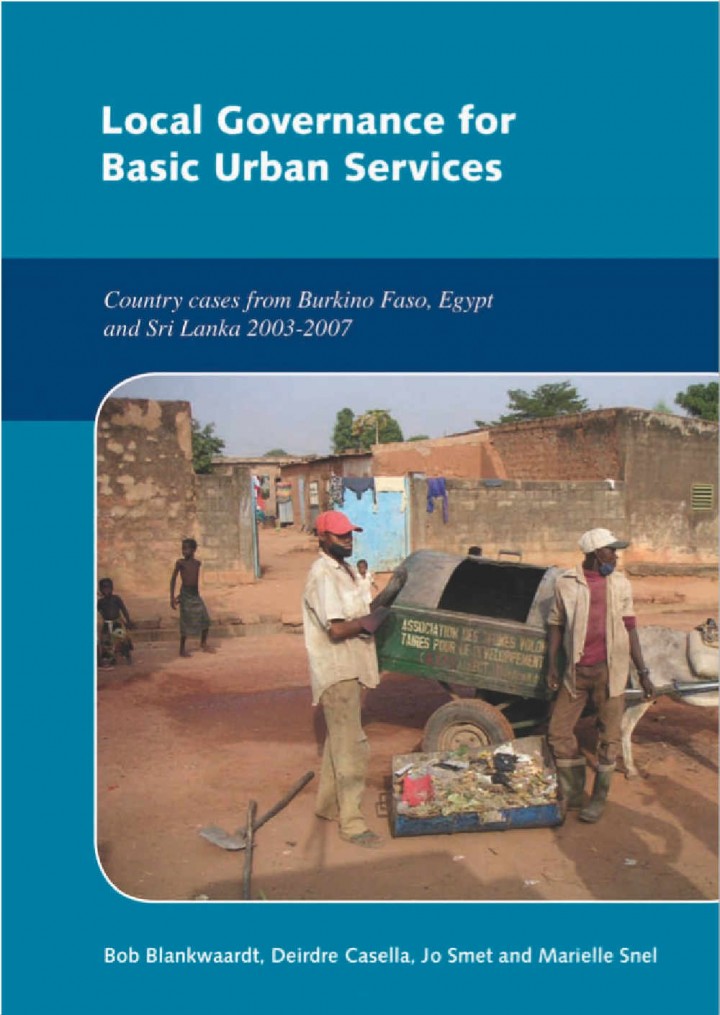Local Governance for Basic Urban Services - Country cases from Burkina Faso, Egypt and Sri Lanka 2003-2007
Blankwaardt, B. et al. (2008)

Published in: 2008
Pages: 56
Publisher:
IRC International Water and Sanitation Centre
Author:
Blankwaardt, B. et al.
Uploaded by:
SuSanA Admin
Partner profile:
IRC
5942 Views
82 Downloads
Location of library entry
This short booklet presents a summary of IRC’s activities within the framework of the Basic Urban Services (BUS) Initiative, carried out over a five-year period (2003-2007) through an Agreement of Cooperation with UNCHS (UN-Habitat). The activities formed an integral part of, and contribution to, the implementation of the Second Phase Dutch Support to the Sustainable Cities Programme (SCP). This second phase aimed at ensuring that local SCP partners play an increasingly important role in achieving the Millennium Declaration targets for poverty reduction, by strengthening programme support at regional and national levels. A partnership was established with IRC in recognition of its specialised expertise in the field of basic urban environmental services and experience in:
• facilitating public participation processes in water supply and environmental sanitation,
• capacity-building of resource centres, applied research, case study development,
• documenting good practices, and information brokerage.
The objective of this booklet is to share the major experiences and lessons learnt, to highlight the remaining challenges and to suggest ways forward, in particular in scaling up the BUS demonstration projects. It addresses a variety of readers. Those most directly involved in the BUS/SCP project include municipalities, anchoring institutions and donors such as UN-Habitat, UNEP and UNDP. It may also be of interest to readers who want to know more about the process, outcome and suggestions for the future in a project such as this. In this booklet, emphasis has been put on the demonstration projects and other country related activities, because of their importance for obtaining direct and tangible results.
Chapter 2 provides some background information on the overall process as applied within the SCP, and on adaptations deemed desirable for the specific purpose of interventions in the field of BUS. It also describes in summary the principal strategies applied in the BUS programme. In chapter 3, an outline is given of the situation in each of the demonstration project countries with respect to BUS. Chapter 4 describes, by country, the institutional, social, technical and financial aspects of the process development. Lessons learnt are developed in Chapter 5, and key challenges and suggestions for the way forward are given in Chapter 6. Annex A presents the essentials of IRC’s BUS Concept Paper. Annex B gives a chronological overview of general and country-wise events, activities and milestones. The documentary outputs of the initiative are presented in Annex C.
Content - Summary
1 Introduction
2 The SCP/BUS Initiative in brief
2.1 The Sustainable Cities Programme
2.2 The Environmental Planning and Management process
2.3 The SCP/BUS approach
2.4 SCP-BUS and good local governance
2.5 Countries and cities in the BUS Initiative
3 BUS context in the demonstration countries
3.1 Burkina Faso – BUS context at the start of the project
3.2 Sri Lanka – BUS context at the start of the project
3.3 Egypt – BUS context at the start of the project
4 Process developments in the projects
4.1 Burkina Faso
4.2 Sri Lanka
4.3 Egypt
5 Reflections on the projects
5.1 From the Burkina Faso experiences
5.2 From the Sri Lanka experiences
5.3 From the Egypt experiences
5.4 Summary
Annex A. Excerpts from BUS Concept Paper 38
Annex B. Chronology of BUS activities 2003 – 2007 47
Annex C. Documentary outputs of the BUS Initiative
Bibliographic information
Blankwaardt, B. et al. (2008). Local Governance for Basic Urban Services - Country cases from Burkina Faso, Egypt and Sri Lanka 2003-2007. IRC International Water and Sanitation Centre
Filter tags
East Asia & Pacific English Middle East & North Africa Sub-Saharan Africa Urban (entire city)















